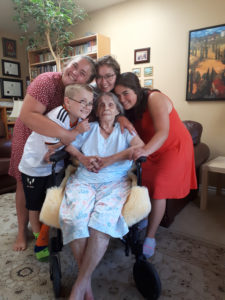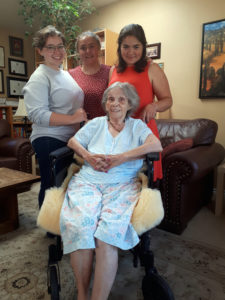Our first sign of trouble was an email from mom’s seniors’ residence. They warned that mom was “starting to fade.”
Fade? Her residence here in Calgary had locked down in March, and after two months without visitors, mom had mostly stopped eating. Now she was refusing to get out of bed — what the staff of her “memory ward” took to be the start of a death spiral.
Mom “fading” couldn’t be a surprise. After all, she turned 100 last November. But until the lockdown, she was as healthy as the proverbial horse. She had only the vaguest notion where she was, but she was still a lively conversationalist, sharing anecdotes about growing up a Puerto Rican New Yorker in the 1920s, becoming a registered nurse at Harlem General, and meeting dad (who has passed) as an oil company nurse in Venezuela in the 1940s.
Unlike most memory wing residents, mom had a lot of company before the lockdown. Uproarious lunches with one of our daughters on Mondays, suppers with my sister on Wednesdays, breakfasts with my brother weekly, and happy hour (rye and water) with everyone on Fridays. But now, after two months without visitors, she was bedridden.
We scheduled a “window visit” with mom at the residence, confirming what we feared. Parchment skin, sunken eyes, apathy. She had wilted. If we left her there, she would be dead in a week — not a pandemic victim, but one of the uncountable (and politically irrelevant) victims of the pandemic precautions.
The proverbial horse is healthy, because we shoot the sick ones. But not mom. Whatever the risks, we had to bring her home. After gutting and painting a main floor bedroom, we had her here in 48 hours.
The stars were perfectly aligned. Our three daughters (ages 15, 18 and 19) had finished school, my wife is unemployed, and I’m semi-retired. So, we can’t pretend that our case is some sort of general model. But we’re learning something that might suggest a vague aspiration.

Nora (Sally) Woodard, 100 years and nine months old, with grandchildren John (11), Meg (20), Emma (18) and Nora (15).
Mom’s hospital bed just fit in the room with a second bed (phew!). So, the girls drafted a schedule. For three straight nights, one of them sleeps with their grandma — who talks in her sleep. During the day, the two rested daughters and my wife take four-hour shifts. My wife and sister manage the medications and home care. Eleven-year-old John is the full-time jester. I get off easy, handling the laundry and brushing mom’s dentures. The girls are OK with toilet duty, but grossed out by their grandma’s dentures.
And, from gnarled roots, mom is budding again.
She’s eating and recovering her strength, her eyes are awake, and her conversation coherent. She can get testy, even very testy, but that’s better than zombie. Daily, she rereads the same first chapter of the same Agatha Christie book. She’s never certain where or especially when she is, drifting back and forth through different periods of her life, like Billy Pilgrim.
Sometimes mom thinks she’s in an old-style foundling home: “What do you do for them here?” she asks, gesturing at the kids, bustling about the house.
“Oh, the usual,” I answer. “Feed ’em … Clothe ’em …”
She muses, “I think I worked here when I was 16 …” Did she?
Mom’s moments of pure joy are visits from our toddler grandkids – her great-grandkids. Their mutual delight is a fascinating sight. Undistracted, the ancient and fledgling stare at each other in crescendos of cooing and hand-waving, wonder multiplying in parallel mirrors.
But why bother? What’s the point? How could we inflict such demeaning drudgery on teenage girls?
 Well, the granddaughters insisted. Again, our own serendipity can’t be a general model, but it may suggest a perspective. We don’t serve our aged very well — duh — largely because we can’t think what to “do” with them. But with mom at home, though the daily details seem daunting, our lived experience is much like camping.
Well, the granddaughters insisted. Again, our own serendipity can’t be a general model, but it may suggest a perspective. We don’t serve our aged very well — duh — largely because we can’t think what to “do” with them. But with mom at home, though the daily details seem daunting, our lived experience is much like camping.
Camping? Why do we strip ourselves of our modern conveniences, to live as primitives? When breakfast cleanup is only a prelude to lunch prep? When the nights are nothing but conversation and the stars? Why?
To return to basics. To reset our expectations. To recover our appreciation of simply living. If we say “work-life balance,” we’ve already conceded too much. Utility is merely useful. Life trumps everything, like a newborn in the house.
So what’s next? What happens when the girls go back to school? We don’t know.
Mom could be gone in a week, or live to be 104. A day at a time, and a day at 100, is just as much a day.
Photos courtesy of Joe Woodard.








Good job, Dad!